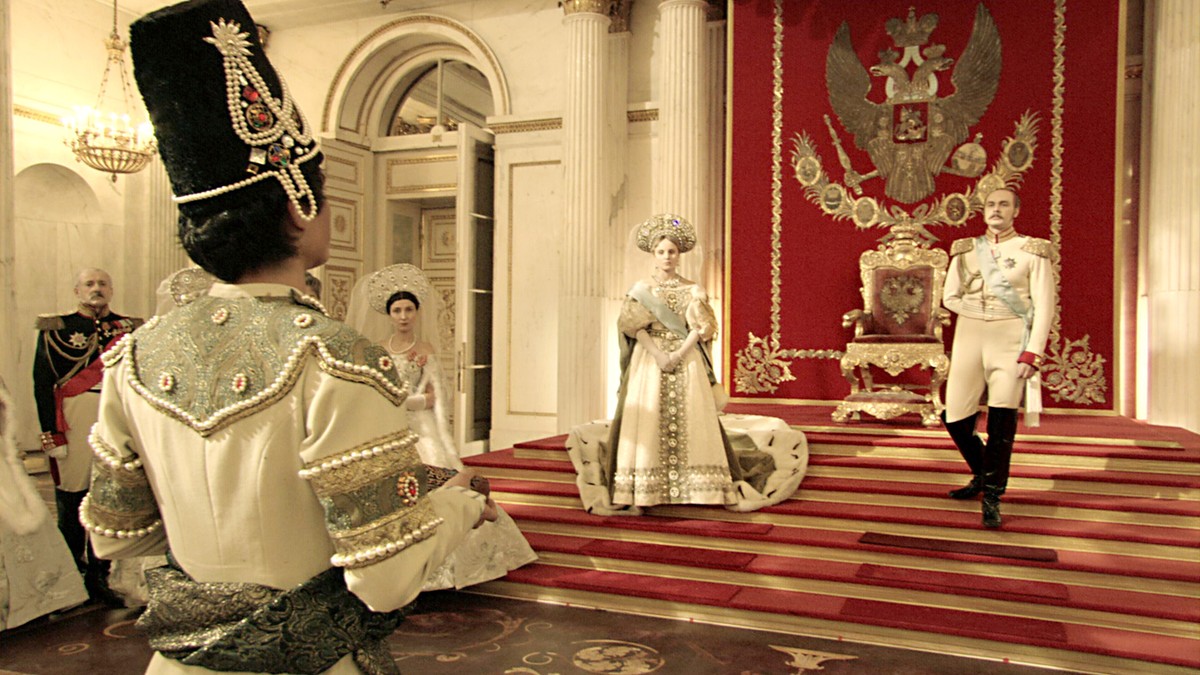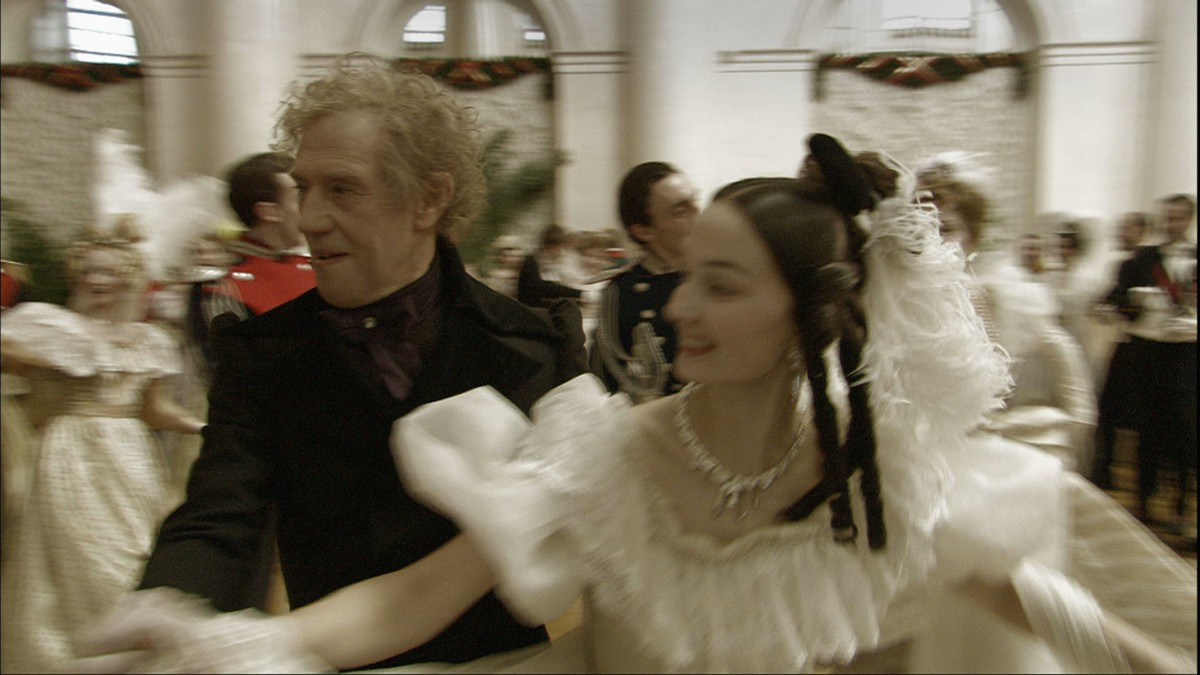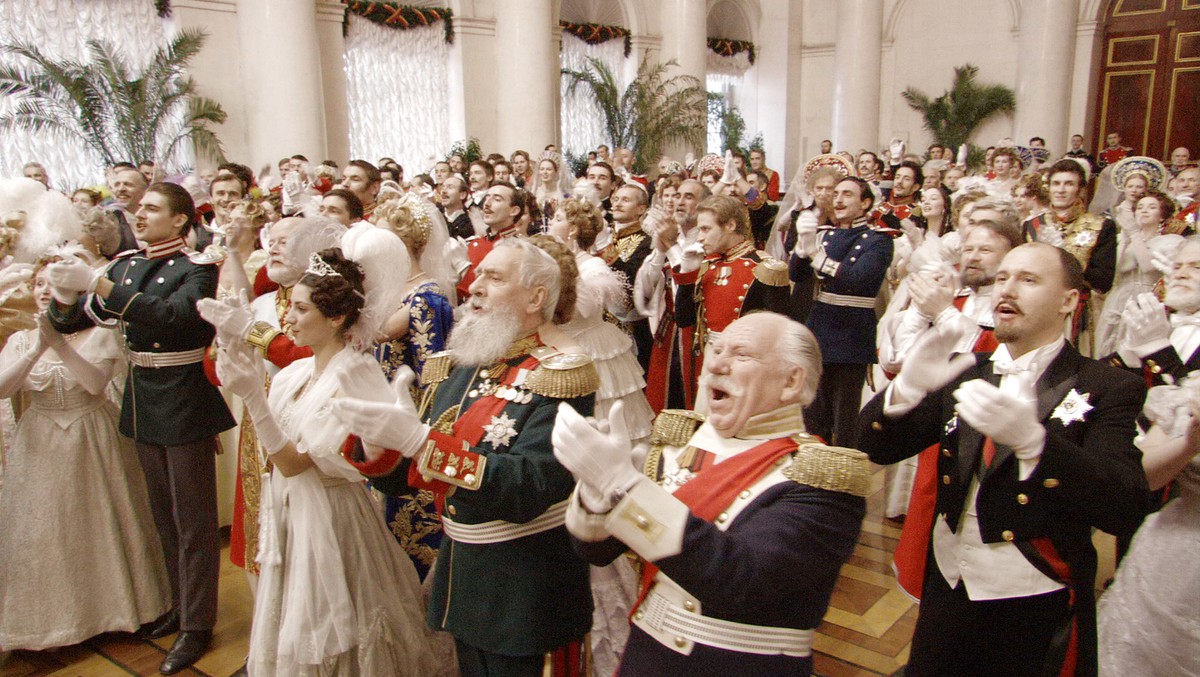Russkij kovcheg - Russian Ark
A film shot in on shot with no break. On a winter's day, a small party of men and women arrive by horse-drawn carriage to a minor, side entrance of the Winter Palace. The narrator meets another spectral but visible outsider, "the European", and follows him through numerous rooms of the palace. Each room manifests a different period of Russian history, but the periods are not in chronological order. Featured are Peter the Great harassing one of his generals; a spectacular presentation of operas and plays in the era of Catherine the Great; an imperial audience in which Tsar Nicholas I is offered a formal apology by the Shah of Iran for the death of Alexander Griboedov, an ambassador; the idyllic family life of Tsar Nicholas II's children; the ceremonial changing of the Palace Guard; the museum's director whispering the need to make repairs during the rule of Joseph Stalin; and a desperate Leningrader making his own coffin during the 900-day siege of the city during World War II. A grand ball follows, featuring music by Mikhail Glinka, with many of the participants in spectacular period costume, and a full orchestra conducted by Valery Gergiev, then a long final exit with a crowd down the grand staircase. The narrator then leaves the building through a side exit and sees an endless ocean, but does not look back or see the building, which can be interpreted as an ark preserving Russian culture as it floats in the sea of time.
Festivals & awards
Nomination European Filmaward
Toronto 2002 - IFC Visions Award
Cannes 2002 - Wettbewerb
Karlovy Vary 2002; New York 2002
Chicago 2002; Montreal 2002
Viennale 2002; London 2002
Pusan 2002; Rotterdam 2003












Credits
Would you like to show this movie?
Please fill out our form.
Feel free to contact us
Press voices
«Très remarqué au Festival de Cannes 2002 pour son exploit inédit, L'Arche russe confirme l'absolue singularité d'Alexandre Sokourov, cinéaste trop rarement programmé. (...) Le titre signifie clairement une Russie d'avant le déluge, mais l'idéologie sans doute passéiste reste heureusement en retrait d'une formidable expérience esthétique, temporelle et sensorielle. Au-delà de ce qui apparaît à l'écran, ce film résolument moderne et contemplatif invite en effet le spectateur à une méditation plus large sur son propre rapport à l'art et à l'histoire.»
Norbert Creutz, Le Temps
«Le résultat se révèle stupéfiant. Mieux : contrairement à ce à quoi l'on pourrait s'attendre, il n'est jamais ennuyeux. L'histoire, ses va-et-vient grotesques ou magiques, son apparent chaos, ses zones d'ombre, sa grandeur et la petitesse de ceux qui la font, tout, ici, se résume en un seul mot: enchantement.(...)Le final, où l'on quitte le musée aux côtés de toutes les âmes qui y étaient retenues prisonnières, nous rend à nous-mêmes. A l'être de chair que nous sommes, et surtout à notre étourdissement une fois la pesanteur revenue. Cette confusion des sens atteste à coup sûr que L'Arche russe est un chef-d'oeuvre.»
Emmanuel Cuénod, La Tribune de Genève
«Dans un dernier souffle, la caméra se tourne vers la Néva, se rapproche des berges. L'image devient charbonneuse. Des vapeurs blanches montent du fleuve, manteaux brumeux sur un océan chaud, on dirait des vagues en plastique comme les aimait Fellini, on dirait les fumées du Styx, la mer allée avec la nuit, le passé, le présent et le futur mariés.»
Jean-Baptiste Morain, Les Inrockuptibles
«Ein ungeheuerliches, opulentes filmisches Erlebnis.»
Chicago Times
«Ein Film wie ein Traum.»
Hearald Tribune
«Ein Highlight.»
Der Spiegel
St. Petersburg und die Ermitage
Im Jahr 2003 ist St. Petersburg 300 Jahre alt. Im Herzen dieser
atemberaubenden Stadt, am Ufer der Neva, liegt die Ermitage, eine der
herrlichsten architektonischen Ensembles der Welt zu dem etwa der
Winterpalast gehört. Ursprünglich von Peter dem Großen als bescheidener
Winterpalast gebaut und von seinen Nachfahren vergrössert, wurde das
Ermitage-Museum von Katharina der Grossen gegründet. 1764 kaufte sie 225
Gemälde für ihre private Bildergalerie. Ihr erklärtes Ziel war es damals,
alle anderen europäischen Monarchen mit ihrer Sammlung zu übertreffen.1917
war der Winterpalast der Schauplatz der Oktober-Revolution. Heute ist die
Ermitage eines der grössten und berühmtesten Museen der Welt.










